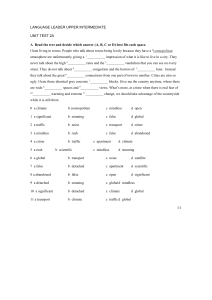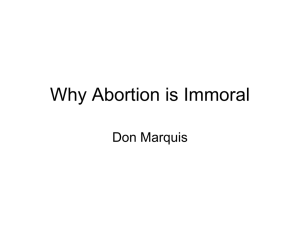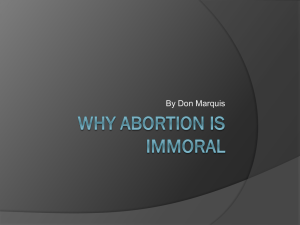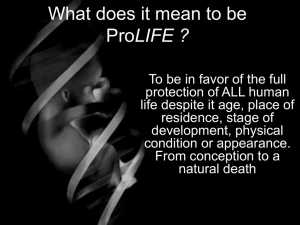Hershenov`s Health, Harm and Potential
advertisement
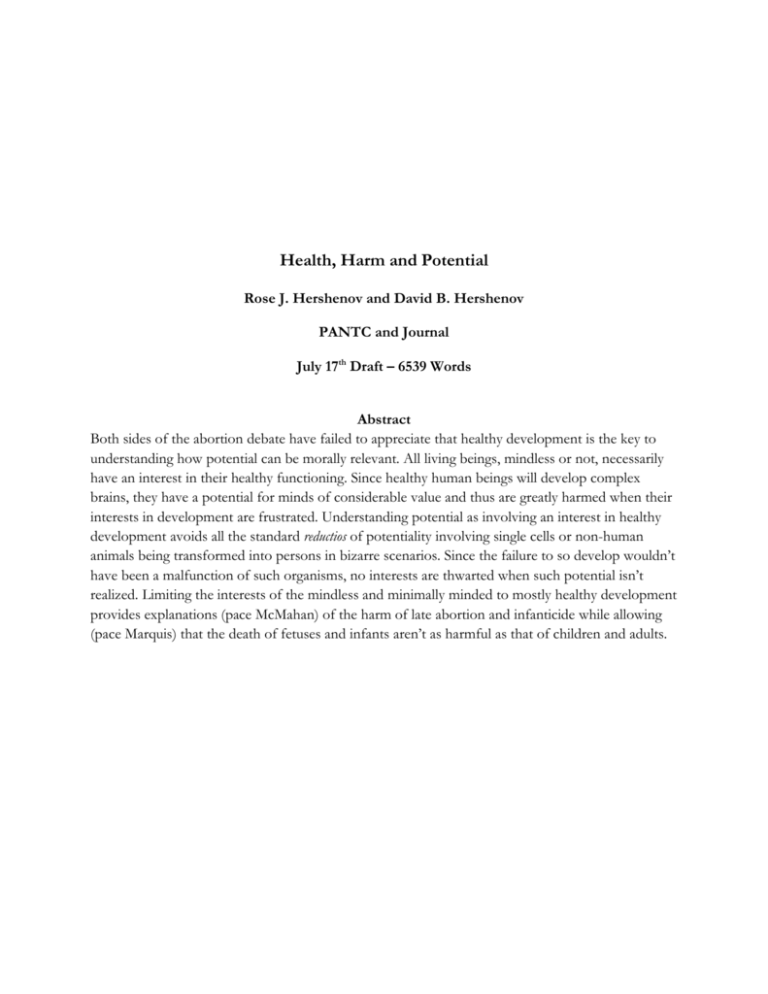
Health, Harm and Potential Rose J. Hershenov and David B. Hershenov PANTC and Journal July 17th Draft – 6539 Words Abstract Both sides of the abortion debate have failed to appreciate that healthy development is the key to understanding how potential can be morally relevant. All living beings, mindless or not, necessarily have an interest in their healthy functioning. Since healthy human beings will develop complex brains, they have a potential for minds of considerable value and thus are greatly harmed when their interests in development are frustrated. Understanding potential as involving an interest in healthy development avoids all the standard reductios of potentiality involving single cells or non-human animals being transformed into persons in bizarre scenarios. Since the failure to so develop wouldn’t have been a malfunction of such organisms, no interests are thwarted when such potential isn’t realized. Limiting the interests of the mindless and minimally minded to mostly healthy development provides explanations (pace McMahan) of the harm of late abortion and infanticide while allowing (pace Marquis) that the death of fetuses and infants aren’t as harmful as that of children and adults. I. Introduction We contend that both sides of the abortion and embryonic stem-cell debates misunderstand the morally relevant sense of potential. A mistake many pro-lifers make is to insist that it is sufficient for an embryo to warrant moral protection if it has an identity preserving potential to become a creature of considerable value in virtue of the mental traits that it will acquire. But identity with a valuable future person is only a necessary condition for moral status. Furthermore, merely possessing an identity preserving potential to become a person can’t explain why it seems that those whom death deprives of the most years of a valuable future (zygotes, embryos, newborns) aren’t harmed as much by their deaths as you and I are by ours, despite our typically having fewer years of a valuable future awaiting us. A different mistake is to maintain that the active or intrinsic potential of embryos to become like us is necessary for potential persons to have a right to life. Not only is the line between active and passive potential difficult to draw but it turns out to be morally irrelevant. Moreover, since active potential is absent in cases of congenital retardation, devotees of such potential can’t explain why we have a duty to cure such disabled humans but not to induce personhood in healthy non-humans of equivalent mental development Defenders of abortion and embryo destroying stem cell research wrongly believe they can show that any account that values potential can be reduced to absurdity. They attempt to do so with scenarios where clones could be produced through manipulating the nuclei of somatic cells, early embryonic cells have their totipotency realized, gametes develop parthenogenetically, and nonhuman animals acquire personhood as a result of sci-fi injections, peculiar developmental regimes, or relocation to alien environments. But not valuing potential seems to itself lead to the absurd conclusion that infanticide isn’t harmful or wrong since infants have little in the way of mental features that are of intrinsic value, nor can they conceive of the future that death deprives them. Denying potential’s significance leads to a failure to recognize the interests possessed by the mindless (or minimally minded) and of the harm that occurs as a result of their premature death. 2 We’ll show that none of these problems remain once it is realized that the morally significant potential lies in the notion of healthy development. We argue that mindless and minimally minded creatures have a good and as a result interests in healthy development even if they don’t have the mental sophistication required to desire such developments. It is this potential which makes the varieties of embryo destruction and infanticide prima facie wrong.1 We’ll proceed by expounding upon the notion of healthy development or proper function and the interests that the mindless and minimally minded have in such development. We’ll explain why the potential of healthy development is morally relevant in the case of young, mindless humans but much less so with other organisms when they are mindless. We’ll explicate the relationship between health or proper functioning and flourishing. We’ll argue that our claim that healthy functioning is the key to morally relevant potential isn’t undermined even in cases where diseases are not only not harms but are also beneficial. While health is a necessary condition for flourishing, it is not the whole story. In the paper’s second section we will show that our construal of health avoids all the alleged reductios. Even if we admit that there are entities whose identity is preserved through fertilization, cloning or parthenogenesis, this won’t mean they have interests that are frustrated by their deaths. The distinction between passive and active potential will also be seen as irrelevant. We can explain the moral relevance of the potential of the congenitally retarded fetus or the comatose adult even if they need massive interventions to realize their potential for rational thought. But this doesn’t We write prima facie wrong because we don’t here provide a sustained argument against a Thomson-like claim the burdens of maternal support are so great that they don’t have to be provided. But we are unconvinced that Thomson’s argument works if the fetus is really a person. In fact, we don’t even think Thomson’s argument works if the life to be saved is that of a merely potential person. Imagine hurricane winds throw you and a premature newborn baby boy, who is only a potential person, onto a damaged roof. The roof will collapse because of his wiggling and you will both fall, the impact will produce in you nine months of pregnancy-like pain but your body will safely cushion him. The fall is as painful as a birth and there will be months of swelling, back pain, nausea, frequent urination etc. You can physically maneuver so he hits the ground first and dies and you use his body to cushion your fall. It seems morally impermissible for you to avoid using your body to keep someone alive when so withdrawing your aid would kill him. 1 3 commit us to admitting the moral significance of any passive potential to become a person. Neither an appeal to passive or active potential captures the morally relevant features of potential. We’ll end with a comparison of our view with both the well-known argument from potential of Don Marquis and the critique of that approach offered by Jeff McMahan. Our account can make better sense than Marquis’s of death being less of a harm to an embryo than its mother despite the embryo otherwise being the recipient of a more extensive and thus valuable future. We can do so without having to agree with McMahan that the fetuses and newborns have little or no moral status and can’t be significantly harmed by their deaths because they lack the mental lives needed to be harmed or wronged by their deaths. We locate our position between those of Marquis and McMahan. Marquis stresses the wrongness of killing and the harm of the death depends upon the valuable future while McMahan maintains the harm of death to embryos and infants is none or very little because they either have no minds or very minimal psychological ties to the future that abortion or infanticide deprives them. Marquis is wrong to think that identity with a future person is sufficient for the embryo to earlier have an interest in all of the person’s future experiences. McMahan doesn’t make that mistake, but he’s wrong to claim that the embryo doesn’t have any interests in its future flourishing. We contend that the mindless human organism has interests only in healthy development while a person has contingently acquired many other interests which death can frustrate in addition to that of healthy physical and mental functioning. Ergo, the deaths of the more developed frustrate more interests and thus are greater harms. II. Health, Harm and the Potential that Matters We’re skeptical of Tooley/McMahan/Singer-like claims that newborns and the unborn lack the interests necessary for a right to life. We think that they fail to distinguish something being in an individual’s interest from that individual taking an interest in something.2 It is in the embryo and neonate’s 2 These views are found more often in the environmental than bioethical literature. See Taylor and Regan. 4 interest to live on even though they have not taken an interest (i.e., desire) to live further into the future. Analogously, vegetables are in a child’s interest but he’s not interested in them. All living things have an interest in healthy development. We can ascribe interests to potential persons, even mindless ones to live and develop in a healthy fashion by which they will flourish. It may even be that consciousness evolved to promote well-being that organisms had previously furthered without awareness of doing so. If one doesn’t accept that non-sentient beings can have welfare then one won’t be able to explain the harm of your lapsing into a coma or the benefit of your coming out of coma for harms and benefits involve changes from one level of well-being to another, not a move to or from the absence of any well-being.3 Our contention is that all living entities are capable of well-being and have an interest in their good. We disagree with Feinberg’s claim that when “we speak of weeds flourishing… this way of talking is a plain piece of irony…” Even blades of grass can be said to literally thrive and thus have an intrinsic well-being and a non-ironic and non-metaphorical interest in sun and nutrient-rich soil. Despite having interests, a blade of grass has a future that isn’t very valuable, so its interests are given far less moral weight than those of human beings. Assuming that the degree of the harm of an entity’s death depends, in part, upon the value and extent of the well-being that it loses out on, the grass is harmed very little. A healthy human fetus, on the other hand, has the potential to realize mental capacities of considerable value that will enable it to flourish to a considerable extent. While we don’t have a fully worked out theory of value, we think it safe to assume that the best theory of value will have to accommodate the datum that creatures with minds like ours are more valuable than living things that are not capable of such thought. But even if one hypothesizes that all organisms are of equal value, differences in their mental capacities will generate differences in There is a difference between the absence of or no well-being on the one hand, and zero or low-level well-being on the other. We were all devoid of any level of well-being, even zero, before we existed and that explains why coming into existence isn’t a benefit. The comatose have zero or low well-being, unlike the non-existent and artifacts, mountains etc, which have no well-being. 3 5 degrees of future deprivations and that should account for the greater moral protection of very young human beings than non-human organisms. This egalitarian view is a bit like Harman’s but she claims that potential only matters morally when a creature is conscious.4 We’re skeptical that minimal fetal or neonatal consciousness could be important for immunity from being killed. Consider a newborn unaware that she needs some surgical procedure to avoid a painless disease and death. It seems very plausible that the infant has an interest in her health being preserved even though she isn’t aware of that interest. So if consciously conceptualizing that interest isn’t required for that interest to belong to the neonate, then that interest should exist earlier in the embryo before there was any consciousness at all. Moreover, it is very difficult to see why consciousness would make such a harm a morally significant harm if the conscious newborn isn’t even conscious of its longstanding interest in its life being preserved. This is why we find it hard to believe Harman’s claim that while mindless embryos have an interest in continued life and are “severely harmed” (185) harmed by their death, such interests don’t have any moral significance whatsoever since the embryos are not conscious. Our contention is that the morally relevant sense of potential is determined by what is healthy development or proper functioning for things of that kind in the environment in which they evolved.5 Perhaps as an adaptation or co-optation (exaptation) of existing forms, evolution has bestowed upon healthy human fetuses the potential to develop minds of great cognitive and affective abilities. These abilities will enable them to enter into various rewarding relationships and exercise a range of cognitive skills that enable them to think and act in valuable ways unlike any other kind of living being. So their potential means that they’ll be greatly harmed if deprived of that However Harman does consider, though doesn’t endorse, a way in which babies could be said to have greater moral status than cognitively equivalent cats. She explains that “babies are susceptible to a range of serious harms and extraordinary benefits more significant than anything that cats are susceptible to; so babies can be the source of stronger reasons than cats can be…Understood in this way…babies’ moral status is raised by their potentiality” (197, nt, 17). 5 Harman surprisingly declares that she will “will not offer any independent argument for” the claim that “a being has moral status at t just in case in case it is ever conscious.”(184) 4 6 valuable future. It might help readers appreciate the value of the activities that a healthy human mind makes possible if they consider the absence of healthy functioning. Wakefield writes: “Very roughly, psychotic disorders involve failures of thought processes to work as designed, anxiety disorders involve failure of anxiety and fear generating mechanisms to work as designed, depressive disorders involve failures of sadness and loss-response regulating mechanisms, disruptive behavior disorders of children involve failure of socialization processes and processes underlying conscience and social cooperation, sleep disorders involved failure of sleep processes to function properly, sexual dysfunctions involve failure of various mechanism involved in sexual motivation and response, eating disorders involve failures of appetitive mechanisms…”(894) For creatures like us, a healthy mind in our design environment is constitutive of a good deal of valuable well-being. But it’s not all there is to flourishing. Humans can be equally healthy but not flourishing equally due to differences in the environment, say they’re both capable of relationships involving love, empathy, and self- restraint etc., but only one finds a companion. Nevertheless, both possess great worth given the great value of their mental endowments. Those endowments enable them to partake in more varied and complex affective and cognitive states than any other kind of living creature. Mindless organisms only have interests in healthy development or proper functioning and the flourishing that involves. So an embryo has an interest in growing a healthy proper functioning brain but no interest then in becoming a football player even if it will later be an adolescent dreaming of Superbowl fame. It isn’t enough for a mindless entity to be identical to a later being to presently have an interest in that later being’s welfare. The future good must be in the mindless being’s interest when it is mindless. And the only basis we can see for ascribing interests to the mindless is by appealing to the good realized by their proper functioning, i.e., healthy development for entities of that kind. Health is a necessary condition for flourishing and constitutive of a good deal of valuable well-being in a healthy person. The living will always have an interest in health-produced 7 flourishing. All flourishing depends upon health being present (to some) degree and every living being has an interest in health at every stage of its life, including its embryonic stages. When mindless, there’s probably nothing else to its good than its health, i.e. its proper functioning is constitutive of its flourishing. Let us dispel some possible misunderstandings of our claim that all have an interest in the flourishing that accompanies healthy development. Some cases of disease are beneficial malfunctions but this doesn’t undermine our thesis. Becoming infected with cowpox during a smallpox epidemic still serves our overall interest in health. While it has been said that “Pneumonia is the old man’s friend,” there’s still a greater benefit in the total absence of disease and the interest in it that thus removes the attractiveness of pneumonia ending the hardships or indignities due to a preexisting disease. That it would be good for a very sick patient to get another disease and die from it is not a reason to say the person lacks an interest in total health, freedom from pneumonia and the preexisting condition, as well as cowpox and smallpox. However, conscious beings may benefit from some diseases and not just because that later increases their overall health. Doctor prescribed bed rest during a hopeless war may not only keep someone alive but it may enable them to find a spouse and vocation. It’s important here to note two things. One is that the conscious can come to acquire interests that override their interest in health such as when being bedridden enables them to discover the joys of philosophy or meet and marry a doctor or nurse. Secondly, supporting the view that a persisting interest is being overridden rather than absent is that any benefits from disease still necessarily depend upon the presence of some health, e.g. proper mental functioning. So their flourishing still has health as a necessary constituent. We can also appeal to overrides to explain those who would be better off if they didn’t live longer due to threats from tyranny and the like. This doesn’t mean they didn’t have an interest in health, it just came to be overridden by a newer interest in freedom and dignity that only emerged after they became self-conscious. 8 It may be anthropomorphic to claim that it’s bad for organisms like amoebas that they fission out of existence or insects that copulate and die. That just might be flourishing for them. It could very well be that this is their nature and good for them given their (alien) form of life. Although human beings don’t go out of existence when we reproduce, it is incumbent upon us to explain away something roughly similar, say a programmed death that frees up scarce resources for offspring (Reznek). If it would be better for humans to survive by malfunctioning, then we would just insist that humans can become conscious and obtain new interests that override their “interests” when mindless in proper functioning involving their cessation. Furthermore, considerable health is still a necessary condition for our flourishing and we need, for example, to be mentally healthy to reap any benefits from the extended lives. So none of the supposed counterexamples show the mindless really do lack an interest in healthy development. That interest is always there, and it’s a necessary condition for flourishing, and there’s always an interest in flourishing. The necessary interest in health may be overridden by interests (pain relief, dignity, freedom) that creatures develop only after they become conscious. But in cases where the malfunction or disease is life prolonging or enables the ill to find their true love, considerable health is still required for them to flourish to the extent they can. III. Avoiding Standard Objections to Potential’s Moral Significance Benn, then Feinberg and later Boonin have claimed that just as potential presidents don’t have the rights of actual presidents, so potential persons don’t have the rights of actual persons. The upshot is that while persons have a right to life, fetuses are but potential persons and so lack such a right. Now they are clearly right that potential in general doesn’t give someone rights and so prolifers would be in trouble if they were claiming that was a general truth about rights for the vast majority of examples would seem to support Benn, Feinberg and Boonin. But the pro-lifers’ claim is just less general. Potential couldn’t make a right that can only be uniquely possessed belong to every individual with the potential to be that unique right holder, nor give individuals rights that obligate 9 them to exercise abilities they don’t have (Kaczor). Potential presidents are too immature and too many to carry out the responsibilities of the office, so their potential would be insufficient for according them presidential rights. However, a person possessing a right to life doesn’t entail duties or an exclusive office that would keep potential persons from simultaneously having a right to life. Our main objection to the analogical argument that allegedly shows potential’s moral insignificance is that it can be taken as showing the opposite and so pro-lifers can always turn the tables and press a different aspect of the analogy. While the potential president (citizen, spouse, adult etc.) doesn’t have the rights of the actual president, he retains his potential to become the president (citizen, spouse, adult etc.) The potential person that is aborted, on the other hand, loses her potential to be the person. So it may be that just as a potential president like yourself has a right to retain that potentiality, similarly, a potential person such as the fetus has the right to retain her potential for personhood. Thus the potential president and potential person analogy strikes us as a bit of a wash. It is clearly the case that potential presidents don’t have all the rights of presidents. But they don’t lose their potential unlike the aborted fetus who ceases to be a potential person. So the analogy doesn’t show that individuals don’t have a right to retain their potential to become persons. Perhaps breaking the tie, or at least providing further reason to be suspicious of the Benn, Feinberg and Boonin analogy, is that infants may be merely potential persons yet surely ought to share the person’s right not be killed. Hopefully our brief sketch suggests some caution is in order before applying as a general principle that a potential X doesn’t have the rights of an actual X. It doesn’t look as if the nature of rights and potential can rule out that fetuses have a right to life.6 We think the earlier example of the Furthermore, it may be that a necessary condition of having a right is that one has an interest in the protection. Dogs may not have a right to vote or marry in part because they have no interest in doing so. But if what we said earlier about interests in health were true, then even mindless fetuses always have an interest in their healthy development and becoming persons. It isn’t currently in the interest of an embryo or newborn to be the president but it is in their present interest to live and flourish. 6 10 neonate benefitting from the life-saving surgery is an example where a potential person has the right to life of a person that cognitively similar non-humans don’t have because they lack the same potential. So we now want to turn to those well-known examples that supposedly show providing potential persons with the right to life lead to reductios. We will respond that if the morally relevant potential is tied to healthy development, then such reductios fail. It’s frequently claimed that appeals to potential are susceptible to refutation by reductio for far too many entities have the potential to become persons. For example, a genetic twin of you could be produced by cloning any cell of your body so even your skin cells are potential persons, yet we’re under no obligation to further such potential. But this isn’t a problem for our account. We don’t even have to rely upon the standard response which is to distinguish the identity preserving potential of an individual to reach a later stage of itself from the potential of one entity to bring into existence a distinct (i.e., non-identical) entity. It doesn’t matter even if the skin cell in the cloning case is identity preserving. Such development isn’t the proper functioning of a skin cell. So even if cloning is identity preserving, it’s not in the initial interest of the original cell to do anything other what healthy skin cells do and so its potential to become a person is morally irrelevant. We can easily extend this treatment to the possibility of gametes being induced to develop parthenogenetically into persons. Likewise for the possibility of the removal of totipotent cells from a few day old embryo and their implantation in a womb to gestate. The potential of a cell if removed isn’t morally compelling because its proper function is to do whatever it was doing as one healthy cell amongst others,7 not what it would be doing if implanted in a zona pellucida by itself with its developmental trajectory reformed. What we have been arguing about single cells can be applied to more developed creatures. If there exist the weird Martian environments where Earth oysters could become persons that Kriegel Even if the totipotency of early embryonic cells was selected to provide backup in case the others cells fail, that wouldn’t give us a duty to develop such potential in the absence of such cellular failure. 7 11 and Hassoun imagine, since Earth oysters weren’t designed (via adaptation or exaptation) to develop that way, it is not in the interests of the oysters to so develop and they thus are not harmed by it not occurring. If one of those oysters came to earth before it developed into a person, we would have a reason to return it to Mars but not send along any Earth oysters. If this sounds arbitrary, it may be helpful if readers keep in mind that they probably believe that two artifacts could be physically identically but one is malfunctioning and the other is not because of a different production history, i.e., one was intended to function in a way that the other wasn’t. It might also help some philosophical readers to consider Chalmers’s zombies in a nomologically different world. Is it bad for them that they can’t have experiences? Would you pray that God change the laws in their world so they could reap the benefits that are metaphysically possible but nomologically closed off? We think not. Tooley famously argued that if potential mattered morally than a kitten injected with a serum that gave it the potential to become a person would have to be protected. (1972: 60-61) Let’s first consider the possibility that the feline injected with a person producing serum was a mindless embryonic feline in utero. Since it would not be malfunctioning (unhealthy) if it didn’t so develop, it wouldn’t be wronged if that potential was neutralized. But if we stick to Tooley’s actual example in which the kitten is conscious but constitutionally incapable then of understanding anything about the serum with which it has been injected, we think it still follows that the kitten lacks an interest in becoming a person. We would argue that its interests are those due to its healthy development (proper functioning) and whatever it consciously desires or would desire under conditions free of distorting influences. It is not the proper function of the kitten to so develop into a person thus so it has no interest in it since it also is not consciously desiring the change. Once the serum has transformed the kitten into a person it certainly has an interest in remaining a person. If the serum was still dormant, no harm would be done in removing it. Ironically, the kitten might actually be initially made ill by the serum in the early stages and thus have 12 an interest in its neutralization. This is because some of the kitten’s organs and neurology might have to be destroyed to enable the physical realization of the person. It would initially be malfunctioning and thus harmed. The appeal to healthy development as the morally relevant potential renders unnecessary any reliance upon the distinction between active and passive potential or the equally problematic intrinsic and extrinsic potential. Tooley recently claimed (2007) that if potential is defended by appealing to our efforts to revive the comatose, then we’ll end up defending the moral significance of passive potentiality. Tooley has in mind coma cases where brain swelling is reduced by draining fluid and so the comatose don’t have the intrinsic or active potential of the healthy fetus in the womb to develop on its own. Tooley then claims that this commits potential’s defenders to an absurd conclusion in Mary Anne Warren’s hypothetical case of a space explorer whose body could decomposed into its individual cells and each of the cells cloned to develop into a person. But since it is not the proper function and thus in the interests of the astronaut’s cells to so develop, defending the moral significance of potential doesn’t commit us to declaring that each cell in his body has a right to life at the expense of his own life. It actually turns out that the appeal to active or intrinsic potential wouldn’t divide up cases as desired by the pro-life proponents of the distinction. For example, there’s no active or intrinsic potential in anencephalic or congenitally retarded human fetuses, but they would surely have a priority over a healthy kitten to receive a scarce serum that made personhood possible for them. We also agree with Lizza that epigenetic factors make it difficult to speak of development as due to just the intrinsic or active potential of the DNA. And we agree with McMahan when he claims that moral intuitions don’t track whether the fetus’s development is due to intrinsic or extrinsic features. He imagines dogs that turn out to have the intrinsic potential to be persons if a previously unknown extensive daily regimen of training is introduced. It seems quite plausible that we lack a duty to so treat those dogs (316). McMahan also observes that it’s implausible to maintain that a human fetus’s 13 moral status would drop and then return if its earlier intrinsic potential for personhood was lost but then restored by a genetic therapy (315). However, if we appeal to healthy development as the morally relevant potential then the intrinsic or extrinsic source of the development is irrelevant. IV. Comparison of Our Account of Potential with McMahan and Marquis’s Accounts We suspect that Marquis’s future-like-ours account cannot avoid the reductios of the previous section assuming they involve identity preserving development. We also believe that Marquis’s approach doesn’t deal as well as ours with the possibility that unrestricted composition is true. And we’ll argue that he can’t account for differences in harm between our deaths and those of embryos and newborns. Marquis famously argued that killing was wrong because it deprived an individual of a valuable future like ours. This was meant just as a prima facie and sufficient condition. After establishing why it was wrong to kill you or me, Marquis then applied the same reasoning to the controversial issue of abortion. Since the fetus has such a valuable future, it is prima facie wrong to kill it just as it’s wrong to kill us. This is a kind of argument from potential. Marquis believes it isn’t susceptible to a reductio that would entail that contraception is wrong because there is not yet a subject of harm, i.e., none of us ever were ever gametes. However, unrestricted composition would mean that there exist scattered composites of gametes and that such a scattered object is identical to the post-fertilization embryo.8 But this isn’t a problem for our view since we maintain that the only mindless entities with interests are living creatures and the scattered object isn’t alive. So our account avoids having to admit some contraception-caused gamete deaths are harmful where Marquis cannot. But Marquis can, of course, just avoid this consequence by denying the truth of unrestricted composition. He could advocate some form of restricted composition and a metaphysics where there doesn’t exist any composites of scattered gametes. 8 When the gametes were in the womb it would even be correct to speak of the scattered composite’s active potential. 14 Still, some of Marquis’s critics have tried to annex his abortion position to contraception, claiming that the fetus’s deprivation is similar to that which prevents someone from coming into existence. The thrust of their argument is that there’s an absence of psychology in any of the entities thwarted by contraception and early abortion. The most sophisticated version is that of McMahan’s Time-Relative-Interests Account of Harm which deserves a more extended discussion than offered below. Our position of what the fetus is deprived of is actually somewhere between that of Marquis and McMahan, though closer to the former. We’re very sympathetic to Marquis’s account, it’s just that we harbor some doubts that it’s enough to be identical to a being with a valuable future that entitles such an entity to protection. We’re dubious that all of the mindless entity’s future valuable states provide interests and reasons to earlier protect that entity. We believe there’s a grain of truth in the protests of Marquis’s critics that the mindless are not appropriately linked to their future to be harmed by the loss of every future thing of value which death deprives them. Of course, we don’t think that it’s true that the mindless lack all interests in their future, but we believe that when they’re mindless that they don’t have certain interests that they’ll have later. We’ve already mentioned the fact that it’s not initially good for the mindless that they will later enjoy football and so not a harm if when mindless they’re prevented from acquiring a later interest in football say by the groundwork then being laid to keep them from developing such an interest (e.g. removing opportunities for exposure to the sport). The reason they’re not harmed then by such actions is due to the contingent nature of their interest in football. Not only may they never have acquired the psychological makeup that makes one inclined to enjoy football, but even in a deterministic world where football is in their future the mindless don’t yet have an interest in it because they haven’t yet developed the psychology that makes them susceptible to enjoying the sport. But they have when mindless an interest in health and will flourish when mindless when that interest is satisfied and will continue to flourish (to some degree) when conscious and healthy. It’ll be impossible for them to flourish when conscious without 15 some degree of mental health. An interest in health is something they’ll always have. It’s a necessary constituent of flourishing and not an interest that they’ll only acquire later in development. Our account of harm differs from Marquis’s in part because while we agree with him that identity is a necessary condition for an interest in a valuable future, we reject his claim that it’s sufficient for giving an entity an interest in its valuable future. The football case just showed an interest that an embryo was lacking, but didn’t yet distinguish the practical implications of our account from Marquis’s for we would agree that there was a valuable future awaiting the individual embryo lacking an interest in football. Our differences with Marquis will materialize in the reductio cases discussed above if cloning and pathogenesis are identity preserving or kittens could be enhanced and made person-like. These would seem to be problems for his unreconstructed account of a valuable future-like-ours but not for our account that stresses the mindless only have interests in healthy development/proper function. Given that earlier discussion, we won’t say anything more about this difference. What we’ll concentrate upon is Marquis’s having a problem accounting for attitudes to the deaths of early embryos and even stillborn infants that our account can avoid. This can be seen by attending to the critique that McMahan offers of Marquis. McMahan’s Time-Relative Interests Account of Harm is contrasted what he calls the Life Comparative Account of Harm that he claims Marquis assumes. To find out if death is bad for someone according to the latter account, we compare the entire life that person lived with the life he would have lived if he hadn’t died then. So if we assume that people typically live until they’re eighty, then the worse death would be that suffered by an embryo who misses out on eighty years and few months of experiences. The death for the toddler who would have lived until she was eighty isn’t as bad for her as the embryo’s death is for the embryo. Even less harmful is the death of the teenager. And the death of a pregnant thirty-five year old woman is far less harmful than the death of her embryo. 16 But McMahan observes that people often don’t find it as tragic and harmful when a few weeks old embryo miscarries than when a baby arrives stillborn; and many find even the death of a newborn less harmful and tragic the death of a thirteen year old boy or his mother. According to McMahan’s Time-Relative-Interests Account of Harm the degree of harm and tragedy of a death depends upon the degree to which the deceased would have been psychologically tied to the future. The adolescent already has a mental life consisting of desires, projects, relationships etc., while embryos have no such psychology that death could interrupt. We maintain that, unlike Marquis’s future-like-ours account, our theory of the interests of the mindless can explain why your death is worse for you than the mindless embryo or minimally minded newborn’s death is for them. The difference is that you have acquired interests that you didn’t have earlier. Your environmental interactions give you interests in say football or interests to engage in particular projects with friends and lovers. The embryo just has an interest in healthy relationships, but they’re without the detailed and contingent interests that will arise from doing things with families and friends in certain environments. So while the embryo or infant has more of a valuable future to lose, McMahan is right that it matters how one is connected to that future. Identity isn’t sufficient. However, we contend that McMahan is wrong to think the only connections that matter are conscious ones. That’s why he has to accept that one human infant can be killed by taking his vital organs to save five other infants just as one pig could be so sacrificed to save five additional pigs (359-60). McMahan maintains that only persons have the moral status that prevents their lives from being sacrificed for the interests of others. He distinguishes a morality of respect owed persons from a morality of interests that governs the treatment of non-persons. Since McMahan doesn’t recognize that the potential to be a person involves an interest in becoming a person that makes great harms possible and warrants protections approaching those of actual persons, he relegates infants to being treated like cognitively equivalent animals. Only their minimal conscious interests are weighed against 17 those of others. Secondly, McMahan’s restriction of interests to conscious ones leads him to admit it could be permissible for people to cause healthy embryos to become so extremely retarded that they won’t develop to where they have the psychological capability to regret their condition (323-24). The only harms of doing so would be extrinsic ones to those who wanted healthy children or are burdened with the medical bills (328-29). Finally, McMahan can’t account for the harm of what he calls “adaptation” where those who acquire handicaps such as deafness due to events after they originate don’t regret it for they come to identify with the deaf community (301). McMahan’s theory of interests can’t explain how the handicapped can be earlier harmed by a deafness they don’t later want remedied. Our theory avoids these counterintuitive consequences. Appealing to an interest in healthy development allows us to justify treating human embryos and infants far better than the non-human animals during the period in which they don’t differ in terms of manifested mentality. References Benn, Stanley. 1973. "Abortion, Infanticide, and Respect for Persons," in J. Feinberg (ed.), The Problem of Abortion (Belmont, Calif.: Wadsworth, 1973), p. 102. Boonin, David. 2003. A Defense of Abortion. Cambridge University Press Feinberg, Joel. 1974 “The Rights of Animals and Unborn Generations” Ed. Blackstone Philosophy and the Environmental Crisis. University of Georgia Press Feinberg, Joel. 1986.” Abortion.” In Matters of Life and Death, 2d ed., ed. Tom Regan Harman, Liz. 2003. “The Potentiality Problem.” Philosophical Studies, 114:1-2, 173-198. Kaczor, Chris. 2011. The Ethics of Abortion: Woman’s Rights, Human Life, and the Question of Justice. Routledge. Kriegel, Uriah and Hassoun, Nicole. 2008. “Consciousness and the Moral Permissibility of Infanticide.” Journal of Applied Philosophy. 25:1 45-55. Lizza, John. 2011. “On the Ethical Irrelevance of Active versus Passive Potentiality” APA 18 Newsletter. 11:1 22-28. McMahan, Jeff. 2002. The Ethics of Killing: Problems at the Margins of Life. Oxford University Press Regan, Tom. 1982. “What Sort of Beings Have Rights.” All That Dwell Therein: Animal Rights and Environmental Ethics. University of California Press. Reznek, Lawrie. 1987. The Nature of Disease. Routledge and Kegan Singer, Peter. 1993 Practical Ethics. 2nd ed. Cambridge University Press. Taylor, Paul, 1986. Respect for Nature: A Theory of Environmental Ethics. Princeton University Press Tooley, Michael. 1972. “Abortion and Infanticide” Philosophy and Public Affairs. 2:1, 37-65. Tooley, M. Jaggar, Alisson, Devine, Cecilia and. Devine, Paul. 2009 Abortion: Three Perspectives. OUP. Warren, Mary Anne. 1973 “On the Moral and Legal Status of Abortion.” The Monist, 57:4 , 43-61 Wakefield, Jerome C. 2005 “Biological Function and Dysfunction” in The Handbook of Evolutionary Psychology Ed. Buss, David. Wiley Press, 878-902. 19
